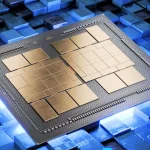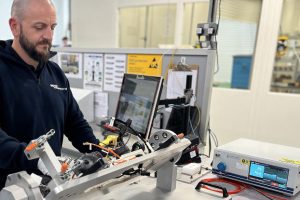The EPSRC’s Strategic Equipment Grant scheme will provide £3m to help the University establish ANALOGUE – the Automated Nano AnaLysing, characterisatiOn and additive packaGing sUitE.
ANALOGUE will enable the rapid prototyping and characterisation of a wide range of semiconductor devices. New developments prototyped at ANALOGUE could find applications in biomedical implants, sustainable and biodegradable sensors, and quantum computing interfaces.
 The facility, which will be based at the University’s Mazumdar-Shaw Advanced Research Centre (ARC), brings together researchers from the University’s James Watt School of Engineering with a strategic network of partners from industry, national semiconductor facilities, and academia, aligned with fast tracking disruptive new technologies into applications.
The facility, which will be based at the University’s Mazumdar-Shaw Advanced Research Centre (ARC), brings together researchers from the University’s James Watt School of Engineering with a strategic network of partners from industry, national semiconductor facilities, and academia, aligned with fast tracking disruptive new technologies into applications.
It aims to support the UK government’s semiconductor strategy by providing access to new technologies to boost cutting-edge research and development. It will also play a role in expanding the country’s semiconductor skills base through industry-led events and partnerships with Centres for Doctoral Training across the UK.
The suite will house chip probing equipment, advanced packaging capabilities, and additive electronics manufacturing using state-of-the-art tools.
The equipment will be automated as a single suite, making it the UK’s first machine-driven integrated assembly and characterisation line for semiconductor devices. ANALOGUE’s advanced automation will allow users to use the suite remotely, with support from on-site experts, helping to streamline the research process.
ANALOGUE will also provide support for ongoing efforts to decarbonise the electronics supply chain by helping researchers gather data on their product’s environmental impact.
ANALOGUE will be open to academia and industry working on low-volume and high-value research and development projects, helping them to rapidly prototype advanced nanoelectronic devices.
“The establishment of ANALOGUE represents a substantial advance in the UK’s semiconductor research infrastructure for heterogeneous integration and advanced packaging,” says Professor Hadi Heidari, Head of the University of Glasgow’s Electronics and Nanoscale Engineering Research Division.
The suite is supported by 27 external project partners including national facilities such as the Manufacturing Technology Centre (MTC) and the National Physical Laboratory (NPL), academic networks (EPSRC eFutures and E-Textiles), and top research universities.
A team of 23 academics and more than 100 researchers and students will make regular use of the facility. ANALOGUE’s industrial partners include Arm, PragmatIC, Inseto, Nano-Dimension, Vector Photonics, Touchlab, Printed Electronics, Kelvin Nanotechnology, Denchi Power, SeeQC, Quantum Science, Labman, Scotland 5G Centre, and CENSIS.
 Electronics Weekly Electronics Design & Components Tech News
Electronics Weekly Electronics Design & Components Tech News



